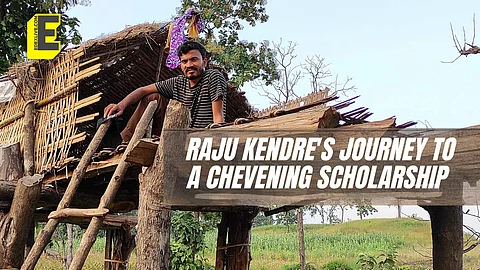

Raju Kendre, a 28-year-old TISS graduate from rural Maharashtra has just won the Chevening Scholarship worth Rs 45 lakh and is set to study in University of London's SOAS. Raju is not just a first generation learner but also runs an organisation called the Ekalavya Movement that helps kids from marginalised sections of society avail mainstream education. We talk to Raju about his achievement, the education system, NEP 2020 and what needs to change. Excerpts from the conversation:
How did you get to know about the scholarship in the first place? How did it all start?
The application process started in September-October and I finally submitted the application in November 2020. The scholarship was already very popular among city kids but students like us (he's from rural Maharashtra) had no access nor any information about it. My mentor is the one who helped by informing me about such scholarships. I was a little apprehensive at first though.
You have said in other interviews that this is not just your achievement but will help other kids too...
Next year, 50 per cent of the applications for the Chevening Scholarship will come from Maharashtra. I can say this confidently. Even I didn't know about this scholarship one and a half months back. But now, a lot of people know about it. This, I hope, works as an inspiration. When someone from any marginalised section achieves something like this it acts as a motivation for the others. Moreover, this is not just a cash reward, but an opportunity to be part of a forum where I can meet new people across the world and increase my network. This will help my organisation as well. We have just one centre at present, I want to scale up to at least five. The scholarship has direct and indirect effects that will help a lot.
What's the plan? Stay back in London or come back home and continue grassroots work?
I want to come back as soon as I can. That's one reason why I chose to go to the UK. The Masters programme is one year here as opposed to the programmes in USA which run for two years. I cannot stay away for too long. Ekalavya is still in the incubation stage and it's my duty as the founder to build a strong base for the organisation. The scholarship criteria also directs the scholars to go back to their own countries and work.
For the inspiration you are talking about to work, we need better basic education. Is that progressing? Especially after the NEP 2020 was released...
These are all promises made that are in the wind. You cannot make a policy sitting in New Delhi and expect it to work on the ground. The reality is very different. The issue of the digital divide, which is causing serious problems, has not been addressed yet. Kids in tribal areas are not being able to study for almost the past one and a half years. An entire generation will collapse if things continue this way. Our education system needs to focus more on critical thinking. So much money is being spent on IITs where the graduates eventually go and work in Silicon Valley. This is nothing but brain drain. While on the other hand, I have to write hundreds of mails to people just to go abroad to study.
It is indeed difficult to get funding for humanities courses...
Yes, and the government needs to realise that humanities is what is ruling the scene across the world — from Oxford to Harvard. The central government should give 500 to 1000 scholarships to students from underprivileged sections, especially to those who are first-generation learners, to go and study abroad. Students from urban areas would still be able to manage an education loan. But who will give loans to a farmer's son?
What are your expections from the course?
They asked me why I wanted to go to the UK during my scholarship interview. I would like to tell you what I told them. These universities do action-based research rather than just printing out PhDs as we do in India. There is a lack of connection between what is researched and the reality. I feel the answer to India's developmental issues lie in Europe. If we talk about Human Development Index, most of the countries on top are from Europe. Granted that they are much smaller in size and population (than India), but their approach towards welfare or education is something we can definitely learn from.
